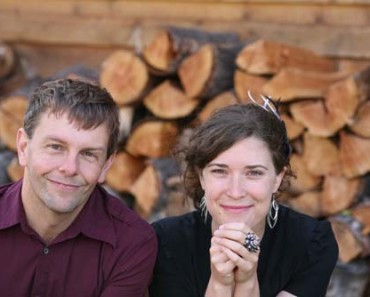
March to May Interview – Beth Wesche (harp & vocals) and Darren Guyaz (guitar & vocals). March to May formed in the Spring of 2013 as a collaboration between singer/songwriters Darren Guyaz and Beth Wesche. Overlaying Celtic folk harp, guitar & keyboards with rich vocal harmonies, they sing deeply relatable stories of every day life and what it means to love, to live, and to reach beyond what seems possible. They sing from the heart, and carry the listener to a place within their own imagination, their own story.
March to May Interview
– What’s new in the world of March to May?
Most of all, we’re very excited to be releasing our upcoming EP, The Water’s Edge! It’s our first release since starting to play music together, and it feels like the beginning of something really special. And ironically, we’re having our release party on a historic steamship here in Seattle.
– How was it recording your EP The Water’s Edge?
It was a tremendous learning experience for both of us. Being able to immerse ourselves so deeply in the technical in-and-outs of our songs gave us the opportunity to explore our songs in an entirely new way. It was intoxicating; I think we both fell in love with the process. We were lucky enough to get to work with an incredible team at Bear Creek Studios – both our producer, Jerry, and with the musicians on cello, bass, and drums/percussion who have now joined us to form our band. We also had some strangely synchronistic experiences, such as recording ‘Falling Down’, which has lyrics that say ‘and the rain keeps falling down…’, and having unexpected downpours in mid-August late into the night. Very powerful.
– How do you build a song up from nothing to become something?
There’s a kind of flow to songwriting when we hit on something good. We co-write almost all of our songs; usually, one of us will hit on some chord or melody that really catches our attention, and then the other of us will jump in and start layering on complementary parts until we have something we’re happy with. Lyrics are usually the last thing to come. We work really well together; writing music feels like speaking to each other in the same language.
– Do you have any tours coming up in the near future?
We’ll be doing a tour through Oregon and Washington this summer to promote the album, and touring on the East Coast this Fall. We’ll be posting updates soon on our website and social media, so make sure to check in and let us know if you’re coming to a show – we’d love to say hi!
– How is the music scene in your area these days?
Seattle’s music scene is thriving – it’s great to be in a community with so many talented musicians – and it’s literally one of the best music cities in the country. We’re always learning from and being inspired by other artists in the area.
– Could you describe some of your earliest influences in life and in music?
Musically, a random smattering of artists and genres: Tori Amos, Sarah McLachlan, Damien Rice, Macklemore, Balkan Beat Box, Glitch Mob, a lot of film scoring… and more recently, the Civil Wars and the Swell Season. Both of us have traveled extensively, too, and that’s definitely shaped our sound and our interests.
– How important are music videos in the industry today? How do they compare to videos from 20 years ago?
They’re still so important! Especially with platforms like YouTube and Vimeo. People love having something visually beautiful or interesting to pair with beautiful or interesting music, and the wide variety of tools out there for musicians to make videos without breaking the bank helps make videos so accessible. They’re great ways to tell a story with a song. We had so much fun crafting the story for our video for Embers to make it fit the mood of the song. We’re shooting a video for Georgia right now – it’s such a dynamic process!
– In your opinion, which album would be essential to have if someone were stranded on a deserted island?
Damien Rice’s O.
– Without social media could bands today manage to survive?
The industry would definitely be different, but bands would survive. There’s something so powerful in the personal connection, whether it’s people hearing a band live or hearing someone’s music through a friend, a colleague, a stranger’s recommendation. There’s a kind of magic to the relationship between an artist and the people who discover their music that way. (Social media definitely helps, though!)
– Any words for new musicians?
There isn’t a single way forward in this. Don’t be afraid to build your life and your music in a way that resonates with you, personally. You’re not going to succeed in this by playing someone else’s game.
March To May on Facebook https://www.facebook.com/marchtomayband
Folk Music Interviews
Camille and Kennerly Interview (Harp Twins)
Dauzat St. Marie Interview (Mat Dauzat and Heather St. Marie)
